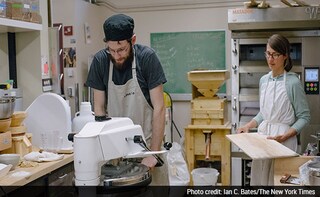The latest piece of equipment at the Bread Lab, a heavenly smelling corner of the Washington State University campus here, is a tortilla press, a gift from Chipotle Mexican Grill.
“Not only did we need to change ingredients, we needed to get most of them out,” Ells said. “We also would have to go back to the tortilla bakery and really change the whole way tortillas are made en masse.”
Chipotle continues to test the tortillas at the Bread Lab and to produce them in small batches.They are golden brown with a slightly nutty taste and a bit of elasticity. “We’ll be increasing the batch size, and the next step is to put it into production to supply a small group of restaurants,” Ells said. “As we prove that’s successful, we’ll expand until we’re supplying the whole region with tortillas, and then move on to the next region.”
© 2015 New York Times News Service
Advertisement
Advertisement
“Not only did we need to change ingredients, we needed to get most of them out,” Ells said. “We also would have to go back to the tortilla bakery and really change the whole way tortillas are made en masse.”
Advertisement
Advertisement
Chipotle continues to test the tortillas at the Bread Lab and to produce them in small batches.They are golden brown with a slightly nutty taste and a bit of elasticity. “We’ll be increasing the batch size, and the next step is to put it into production to supply a small group of restaurants,” Ells said. “As we prove that’s successful, we’ll expand until we’re supplying the whole region with tortillas, and then move on to the next region.”
© 2015 New York Times News Service
For the latest food news, health tips and recipes, like us on Facebook or follow us on Twitter and YouTube.
Advertisement
